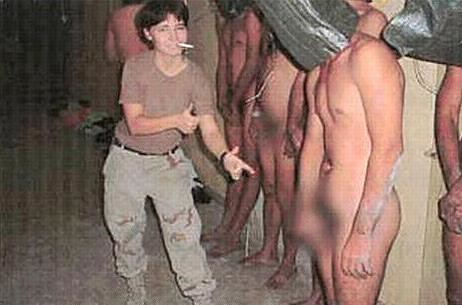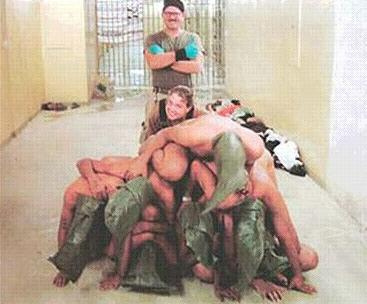| August 6, 2011 uruknet.com War Criminal Charles Graner was released from prison today. It's amazing to read the candy valentines to him from the press. He got a dishonorable discharge and was sentenced to 10 years (he only served six) after, as CNN noted in real time, being found "guilty of 10 charges, including aggravated assault, maltreatment and conspiracy." It was the Abu Ghraib prison scandal -- now a part of the distant history because the Iraq War has gone on so long. Graner and those serving with him abused Iraqi prisoners. They physically abused them, they sexually abused them, they humiliated them and they had no real defense for their actions.
Though some involved in torturing were young, Graner was neither young nor inexperienced. He was already 34 and he'd previously served in the first Gulf War. His parents stated at the time that he was a fall guy for higher ups. There's little doubt (though no one's been able to prove it in court thus far) that the torture orders came from the White House (that was when Bush occupied it). There was no accountability above Graner. But if his parents want to boo-hoo over that, let's remember that Graner refused to take the stand in his own trial. He was caught. He chose not to implicate the ones above him.
He's a War Criminal for his actions and he knows it. After his sentencing, he told CNN, "We were called to violate the Geneva Convention. We were asked to do certain things I wasn't trained to do." He's a War Criminal and he had a choice.
So did the military. The military had many choices when it came to Graner.
After the Gulf War, Graner became a prison guard. In June 2004 (months after the Abu Ghraib prison scandal news broke), David Finkel and Christian Davenport (Washington Post) reported on Graner and his 'work record' which included:
In 1992, he was working at a county prison in Pennsylvania with guards who acknowledge beating up prisoners as a means of control.
In 1994, he made a fellow prison guard sick by spraying Mace into his coffee.
In 1997, he was accused by his wife of threatening to kill her.
In 1998, when he was working as a guard in a state prison, he was accused by one inmate of slipping a razor blade into his food.
That's not the end of his legal problems, but how did that record escape the military? Or was it because of that record that Graner was assigned to Abu Ghraib?
Graner rejoined the military in 2001. How did that happen and how did he remain in the military?
His first wife was Staci Graner. Whatever the marriage was, the separation and divorce were violent. Dennis Cauchon, Debbie Howlett and Rick Hampson (USA Today) reported in May 2004 about after the marriage broke up:
Over the next four years, Staci Graner obtained three temporary protection of abuse orders.
In an affidavit for the first order, Staci Graner said Charles Graner threatened to kill her and told her "that she could keep his guns, because he did not need them for what he was going to do to the plaintiff." A judge ordered the couple to conduct their child custody exchanges at the police station.
For the 1998 order, Staci Graner testified that one night Charles Graner sneaked into the house where she was living with their children and jumped out at her from the laundry room to scare her. "I just don't think this is normal behavior, and he does frighten me," she testified. "I don't want him anywhere near me."
Her affidavit said that Charles Graner "set up a video camera in my house without my knowledge and showed me the tapes."
In 2001, Staci Graner filed a five-page, handwritten affidavit. She said that Charles Graner had come to her house and "yanked me out of bed by my hair, dragging me and all the covers into the hall and tried to throw me down the steps."
Three protection of abuse orders and the military allowed him to re-enlist? Are you getting why women in the military are sexually assaulted so often? No, I'm not accusing Graner of sexually assaulting a fellow soldier (Iraqi detainees, yes) but a military that can overlook three court orders of protection against someone is a military that embraces violence against women and don't pretend otherwise.
Looking at the issues involved -- and it's not just War Crimes -- today, I'm really shocked because I keep coming back to that idiotic plan by Maj Gen Anthony Cucolo at the end of 2009 when he wanted to court-martial any female soldier who got pregnant. And if she would say who the father was (and if he was in the military), he'd be court-martialed as well. Like that was going to happen in most cases. The plan was thankfully dropped due to public outrage.
But Cucolo thought it was needed. And, reality, not only was it not needed but there was no effort to follow existing rules.
Spc Charles Graner used Abu Ghraib as a sexual hookup. How did it help unit cohesion for him to sleep with Megan Ambuhl while both were stationed at Abu Ghraib prison? (He would marry Ambuhl after he was in prison -- with a friend standing in for him in the ceremony.) And do we not grasp how many rules were broken when he entered into a sexual relationship with Pfc Lynndie England? How many rules did that violate and why didn't the military punish Graner for that as well?

Lynndie England (in the photo above) was 21 when the story broke. I've stated many times that she needs to take accountability for her role in the abuse and stop making excuses. Her actions were criminal, they were War Crimes. That doesn't mean on other areas, she doesn't have several arguments to make. Certainly she was used and abused by a superior who not only had a sexual relationship with her but also is the father of her child.
Graner needed to be punished for the War Crimes. That's not in doubt. But the military allowing him to come in after all his domestic abuse issues and the military's refusal to punish him for his relationship with England (or any of the other women) goes a long way towards explaining why the rate of sexual assault is not declining in the military. When they can make an example, they chose not to. By choosing not to, they repeatedly send a message that sexual assault and misconduct is acceptable and just part of being in the military.
They're not the only ones sending that message. Lynndie England immediately became the fact of the Abu Ghraib story. She was a woman so it was 'surprising' to some that she could abuse. She wasn't the only woman involved in the scandal (or in the photos). Long after details began emerging about Charles Graner (who was clearly the ringleader of those who were punished), about his past abuse as a prison guard, about his domestic abuse, long after all of that was in the news, Lynddie was still the shocker. Still the one to glom on. For some sexists.
Doubt it?
Read this sentence: "Indeed, Charles Granier, one of the abusers at Abu Ghraib and the lover of Linndie England the Trailer Park Torturer, worked as a guard at Pennsylvania's notorious Greene Correctional Unit and has since gone back to work there." Graner (his name is mispelled) is just "one of the abusers" but Lynndie (her name is mispelled) is a "torturer" and, not only that, she's so damn trashy: "Trailer Park".
Do you not get the huge pass that's given to Graner in that sentence which demonizes Lynndi who served under him? The sentence acknowledges awareness of Graner's prison work in the US but even that awareness didn't lead to a cute little nickname for Graner like "Trailer Park Torturer," now did it?
Who are we quoting? From "May 8/9, 2004," that's "Torture as Normalcy" by Alexander Cockburn and Jeffrey St. Clair (CounterPunch).
And that template can be found in the reports on Graner's release which refuse to hold him accountable or express shock in the way that was repeatedly done in articles on Lynndie England.
|




